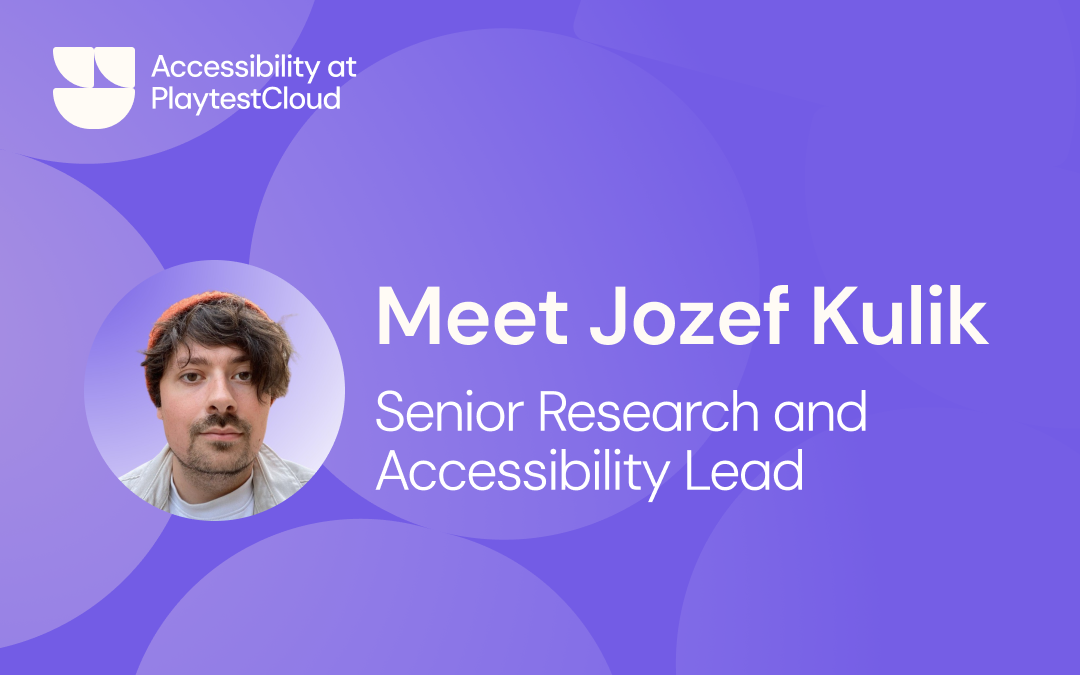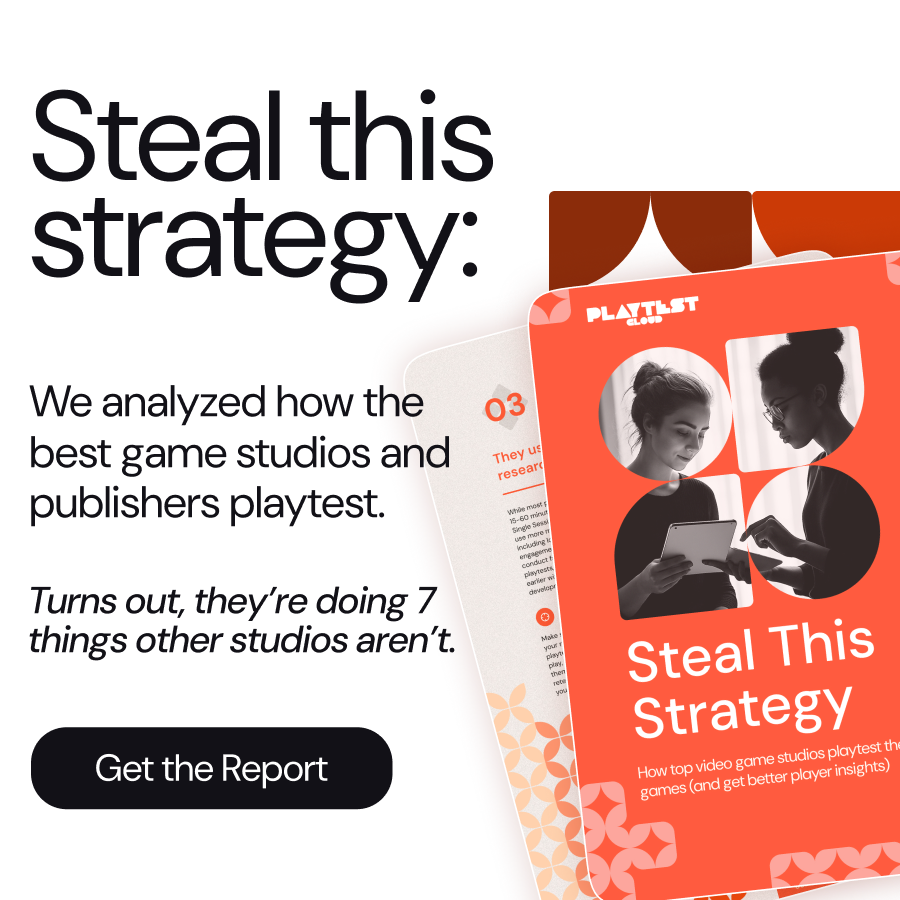Building Accessible Games Starts by Bringing Players with Disabilities Into the Conversation

As many as 25% of players globally have unmet accessibility needs in games. While more studios work to make their games more accessible, there are challenges that push accessibility down the priority list, making it difficult to reach more players and give a great player experience.
“Radical Inclusion” has always been one of our company values, and we extend that value to supporting studios who want to build inclusive games, but aren’t sure how to add accessibility into the research roadmap.
With more demand each day for accessibility playtesting and games research, we've added Senior Research and Accessibility Lead Jozef Kulik to the team to help studios make games all players can love.
Get to know Joe and the games accessibility support our team provides in this article. And if you’ve got questions about how to run playtests with players with disabilities, need to source more diverse players to test, or simply want to pick a researcher’s brain on accessibility, book a chat with Joe here!
Can you share a glimpse into your expertise and background?
Fundamentally, I see myself as an applied psychologist, passionate about using research methods and psychological principles to tackle real-world problems. Game User Research is a prime example of this applied psychology: we leverage surveys, observations, and interviews to gather insights, enabling development teams to bridge the gap between their vision and the actual player experience.
However, my focus on understanding players has expanded significantly. Traditionally, when we discuss "players," we haven't always meant all players. Without intentional effort, the standard mechanisms for game creation often fail to produce accessible experiences.
This requires a conscious shift, stepping outside existing processes to examine where voices from players with disabilities influence design, and where they are inadvertently excluded.
Traditionally, when we discuss "players," we haven't always meant all players.
This realization led me to transition from a traditional user researcher role and pursue a PhD focused on accessible games at York. Collaborating with industry partners, I delved into these challenges, which naturally led to a full-time position at Splash Damage, managing accessibility operations alongside user research.
Now, I'm bringing this expertise to PlaytestCloud, partnering with clients on both user research and accessibility fronts to maximize the platform's value. Through the lens of research enablement and accessibility, I'm here to help clients create better games that resonate with and engage a broader audience.
Why is accessibility crucial?
Accessibility offers numerous benefits for studios, but three stand out: crafting better games for everyone, expanding appeal by addressing the needs of the large and growing audience of players with disabilities, and ensuring compliance with legislation.
1 in every 5 gamers has a disability. That's a ton of potential players who might be excluded or feel uncomfortable if a game isn't accessible. Beyond recognized disabilities, there are also plenty of people who benefit from accessibility features in games and enjoy a better playing experience.
Beyond recognized disabilities, there are also plenty of people who benefit from accessibility features in games and enjoy a better playing experience.
When people hear the word “disability”, they tend to think about wheelchair users. In reality, players with mobility challenges are only a small fraction of disabled players. Players with epilepsy, or dyslexia, or even color blindness (who comprise an astounding 12% of the world’s population) have a need for accessibility features in gameplay.
With nearly one-third of all gamers already over the age of 55 (and more than 60% of people aged 60-70 spending at least one hour gaming per day), experience improvements that make games more accessible impact a broad audience of players.
My mother has been playing games since my sister and I were young. She enjoyed Spyro the Dragon, Crash Bandicoot, and many games we played. However, she struggled with Spyro because she couldn't move and jump simultaneously, or react quickly enough to defeat enemies. She got stuck. It wasn't until she played Naughty Dog's newer games like Uncharted 4 with accessibility settings and difficulty modes that she could finish them. At 70, she still struggles with those older games, but she's conquered Uncharted 4, The Last of Us, and other AAA titles specifically because of accessibility features.
For these players, accessibility is the key that unlocks the game. The worst experience is hitting a hard usability barrier, getting stuck, which stifles engagement. Accessibility is an extension of good usability. If a player with low vision can't read the tutorial text or a player with motor disabilities can't use the controls, they will stop playing, and they'll think twice about playing your next game.
Why Remote Playtesting is a huge advantage for Accessibility in Gaming
A key factor in excluding people with disabilities from testing is the industry's historical focus on in-person testing. Early market research involved observing arcade players. But what if someone couldn't travel to the arcade, stand for long periods, or use the specific arcade controllers? Their feedback was likely missing, and this issue has persisted in user research practices.
What if someone couldn't travel to the arcade, stand for long periods, or use the specific arcade controllers? Their feedback was likely missing.
While labs can be made accessible, there are still barriers between a player's home and the lab. This is crucial for accessibility research. Reaching participants with disabilities and coordinating with relevant organizations can be challenging, pulling developers away from other tasks. People with disabilities are more likely to face commuting challenges, need assistance, and use specialized controllers and seating or equipment at home. They may also have environmental factors (discomfort with certain lighting, sound, or crowds) that would introduce factors impacting how they play the game. I've seen participants play while lying in bed with controllers set up by assistants. These examples highlight why labs aren't always ideal for certain types of testing.
Remote playtesting offers significant advantages, especially for accessibility. PlaytestCloud has done a great job streamlining this process, making remote testing as effective, more scalable and more accessible than in-person, connecting developers with diverse players and providing insights that fit within rapid development cycles.
How does PlaytestCloud support Accessibility in Gaming?
Here are a few examples of accessibility playtesting and research opportunities available on our platform and with our team:
Accessibility Playtests
Test your game within real world conditions with players with disabilities to evaluate the usability and function of your game and its accessibility features.
Accessibility Consultation
Support to build accessible feedback loops into your products and culture with expert evaluations to identify key risks, areas of focus and quick wins.
Accessibility Training
Specialized, expert-led training for your team across design, production, communications and compliance topics.
How do we get started?
The best starting point is thinking about how accessibility can be integrated throughout the development process. The approach for each studio will depend on past efforts, internal responsibilities, expertise, and project-specific accessibility goals. Some studios might need help defining goals and building expertise, in which case consultation is the best first step. This involves discussing game-specific guidelines, relevant legislation, shaping goals, prioritizing accessibility efforts, and creating test plans.
For studios in this boat, I would say the best step is just to start a conversation with us and experts like myself can help develop your internal expertise, and guide your internal plans towards making increasingly accessible games with a mix of strategies, including roadmapping, goal setting, education and playtesting.
Other studios with established expertise and processes might simply need more diverse voices in their development, they might need wider and more effective feedback loops. That’s specifically where accessibility playtesting with PlaytestCloud can truly shine, dismantling some of those barriers to research participation that people with disabilities often experience and bringing different voices through to your teams on a more regular basis.
I’m always happy to have a no-pressure conversation with you or your team and share my experience as a games accessibility specialist. You can book time with me here.
Tags:
August 11, 2025 at 9:46 AM


